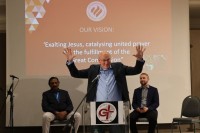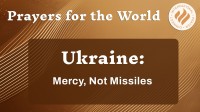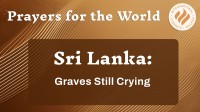Suriname: first woman president faces challenges
Jennifer Geerlings-Simons has made history as Suriname’s first female president, elected amid political and economic turmoil. The 71-year-old physician and lawmaker was backed by a two-thirds parliamentary vote after inconclusive May elections and growing dissatisfaction with outgoing president Chandrikapersad Santokhi’s austerity measures; his administration has also faced corruption allegations. Geerlings-Simons, who ran unopposed, will assume office on 16 July along with her running mate Gregory Rusland. She inherits a nation burdened by debt, economic instability, and public frustration, but one with the hopeful prospect of offshore oil production starting in 2028. Her administration has pledged to stabilise state finances through stricter tax enforcement, but economists warn of a difficult path ahead, with debt repayments nearing $400 million annually. As Suriname approaches its 50th year of independence, the country (which is one of the continent’s poorest nations, with a rich ethnic tapestry) looks to Geerlings-Simons for leadership in a time of fragile transition and high expectations.
Bangladesh: did Sheikh Hasina authorise killing protesters?
A leaked audio recording verified by BBC Eye reveals that former prime minister Sheikh Hasina authorised lethal force against student-led protesters during last year’s deadly unrest. In the recording, Hasina is heard instructing security forces to use lethal weapons and to shoot wherever protesters are found. The protests, initially sparked by opposition to civil service job quotas, escalated into a mass movement that led to Hasina's ousting in July 2024, after fifteen years in power. According to UN investigators, up to 1,400 people were killed in what became Bangladesh’s deadliest violence since its 1971 independence war. The leaked call, which has been authenticated by audio forensics experts, occurred on 18 July, as outrage grew over video evidence of police killings. Hasina, now in exile in India, faces charges of crimes against humanity in a special tribunal. The recording is considered a key piece of evidence in the proceedings.
IPC Connections July 2025 Intro
“The fire must be kept burning on the altar continuously; it must not go out.”
- Leviticus 6:13
We are pleased to bring you the July 2025 edition of IPC Connections!
If you are reading IPC Connections for the first time, may I welcome you to the IPC Global Family! It really is a joy to have you with us as we seek to ‘Exalt Jesus, catalyzing united prayer for Kingdom transformation of peoples, cities and nations’.
I trust that you will be blessed and encouraged as you read the articles, news and resources info this month.
Snapshot from the IPC Regions…
It has been encouraging to meet local, regional and international leaders over the last few months in Asia and Europe! I am amazed as I observe a growing momentum of partnership in Bible-based prayer across the movements – all for the fulfillment of the Great Commission.
 The Asia Prayer Summit, in Batam, Indonesia, in April, led by Daniel and Estell Brink drew together hundreds of leaders of Houses of Prayer across the region. The fruit of that gathering was a collective pledge to plant 40 new 24-7 Prayer Watches – Hallelujah! Their next Eurasia Summit is 13-15 October in Malta.
The Asia Prayer Summit, in Batam, Indonesia, in April, led by Daniel and Estell Brink drew together hundreds of leaders of Houses of Prayer across the region. The fruit of that gathering was a collective pledge to plant 40 new 24-7 Prayer Watches – Hallelujah! Their next Eurasia Summit is 13-15 October in Malta.
Several of our IPC leaders took part in the Global Leaders Summit in Fiuggi, Italy in May, where a joint prayer initiative with Global 33 (Director - Henry Cappello) was launched with the vision to mobilise 133 million Missionary Disciples across the Catholic Church by 2033. This was followed by the G33 Women of Influence Summit (WINS) led by Sabina Cappello.
 E21 - 7,000+ believers from 100+ nations took part in the Empowered 21 Pentecostal World Conference in Helsinki, Finland, at the beginning of June with inspiring teaching from Billy Wilson, Christine Caine and Rick Warren. As well as leading a prayer-focused breakout group, we hosted a 2-hour Pentecost Global Day of Prayer livestream in tandem with Brian Alarid (Director of World Prays), who was located in Spain. It was a powerful time of worship and prayer for revival across the Jewish world with stirring and inspiring teaching from Rick Warren. (See Editorial 2) Thank you to the many prayer leaders who took part! See the 40 minute excerpts video!
E21 - 7,000+ believers from 100+ nations took part in the Empowered 21 Pentecostal World Conference in Helsinki, Finland, at the beginning of June with inspiring teaching from Billy Wilson, Christine Caine and Rick Warren. As well as leading a prayer-focused breakout group, we hosted a 2-hour Pentecost Global Day of Prayer livestream in tandem with Brian Alarid (Director of World Prays), who was located in Spain. It was a powerful time of worship and prayer for revival across the Jewish world with stirring and inspiring teaching from Rick Warren. (See Editorial 2) Thank you to the many prayer leaders who took part! See the 40 minute excerpts video!
Many believers joined in the recently launched Global Day of Prayer for revival across the Catholic Church on Sunday 29th June. It is wonderful to see this fresh wave of worship and prayers for renewal among our evangelical Catholic brothers and sisters, who share the vision to reach every nation by 2033!
 We are into the final week of 30 Days of Prayer for the Church in Israel & Iran (Psalm 122:6) Do join us as we stand with real-life believers facing trials & triumphs across the Middle East.
We are into the final week of 30 Days of Prayer for the Church in Israel & Iran (Psalm 122:6) Do join us as we stand with real-life believers facing trials & triumphs across the Middle East.
Our 4 Global Days of Prayer continue to attract offline and online support, engaging 100 million+ believers each time, for which I continue to be astounded and grateful! The Buddhist, Muslim and Jewish World focused days of prayer have taken place. We are looking forward to the Day of Prayer for the Hindu World in October! – See below…
The Global Family 24-7 Prayer Room continues its rhythm of continuous online prayer – around the throne, around the clock, around the globe!
Christians worldwide are signing up for ‘Shooting Arrows’ - a 24-7 prayer call to raise a Godly generation walking boldly in truth and purpose. This is an excellent Jericho Walls initiative in partnership with IPC!
The Interseed Online House of Prayer are inviting IPC Partners to join their app platform for free. More info below!
Yet there is much more happening, and I am humbled and thankful! All Glory to the Lamb!
Will you become an IPC Prayer Flame Partner?…
 “The fire shall ever be burning upon the altar; it shall never go out.” (Leviticus 6:13)
“The fire shall ever be burning upon the altar; it shall never go out.” (Leviticus 6:13)
This past year, your faithful prayers have been such a blessing to us - and for that, we’re deeply grateful.
As we look ahead towards 2026, the opportunities before us are vast and urgent. To fully embrace this moment, we need a devoted family of monthly supporters to help keep the fire of prayer burning brightly across the nations - just as God commanded His altar fire never to go out.
That’s why we’re inviting you to become an IPC Prayer Flame Partner.
Your monthly gifts - no matter the size - will help sustain and spread this global movement of united prayer, ensuring that the flame on God’s altar of intercession never dies out.
We’ve made it simple and secure to give monthly online through PayPal. Every gift matters. Every prayer fuels the vision. Will you help keep the fire burning?
Click Here to support IPC monthly via PayPal, or visit www.ipcprayer.org/donate
Together, let’s keep the fire on the altar blazing - and see the world transformed by prayer!
 15 Days of Prayer for the Hindu World – 12th-26th October, 2025
15 Days of Prayer for the Hindu World – 12th-26th October, 2025
We invite you and your families, contacts and networks to join us as we pray for 15 days, for Great Commission breakthroughs across the Hindu World.
We have prepared an adult and children's prayer guide that will be published shortly in 30+ languages, free, from the 110 Cities website.
The 15 days culminate in a Global Day of Prayer for the Hindu World on 20th October, with an option to join us online where hourly hosts introduce focused prayers and worship led from across the nations.
This is the fourth of our 4 worldwide days of prayer for 2025! –
Editorial 1 – Growing Together as Family – Dr Jason Hubbard
 This month, we are pleased to bring you two editorial articles!
In the first heartfelt editorial, Dr. Jason Hubbard shares reflections on the precious time he spent with his children and grandchildren, reminding us that family is God’s beautiful design for every stage of life.
This month, we are pleased to bring you two editorial articles!
In the first heartfelt editorial, Dr. Jason Hubbard shares reflections on the precious time he spent with his children and grandchildren, reminding us that family is God’s beautiful design for every stage of life.
Drawing wisdom from Scripture, he explores how fathers and mothers shape homes that radiate God’s love and presence. Amid a world of confusion and pressure, discover practical, biblical insights on nurturing faith-filled families where Christ remains central. Whether you are single, married, a parent, or a grandparent, you’ll be encouraged and inspired to build a family life that glorifies God.
Read “Growing Together as Family” below! | Download PDF
Editorial 2 – ‘Lord Use Me’ – Rick Warren
 In this stirring editorial, Pastor Rick Warren shares a powerful call to prayer and surrender from the recent Global Day of Prayer for the Jewish World. Reflecting on Isaiah’s vision, he unpacks the journey from confession and cleansing to the bold commissioning of God’s people.
In this stirring editorial, Pastor Rick Warren shares a powerful call to prayer and surrender from the recent Global Day of Prayer for the Jewish World. Reflecting on Isaiah’s vision, he unpacks the journey from confession and cleansing to the bold commissioning of God’s people.
Rick challenges us to pray the courageous prayer, “Lord, use me,” and to step into our role in fulfilling the Great Commission as we approach the 2,000th anniversary of the Church. Be inspired to let God transform your life and witness through the fire of His Spirit.
Read or Watch “Lord, Use Me” below | Download PD
Thank you…
“We always thank God for all of you, remembering you in our prayers.” (1 Thessalonians 1:2)
From my heart, I want to thank you for standing with International Prayer Connect. Your prayers, your faith, and your partnership fuel this vision to see Jesus exalted and the nations transformed through prayer.
Together, we are watchmen on the walls, crying out day and night (Isaiah 62:6-7).
 Your faithfulness strengthens the global prayer movement and carries hope into dark places. Know this: your intercession is shaping history for His glory.
Your faithfulness strengthens the global prayer movement and carries hope into dark places. Know this: your intercession is shaping history for His glory.
Let’s keep pressing on—until all the earth is filled with His praise!
Every blessing,
Jason Hubbard - Director
International Prayer Connect
Disclaimer… The views and opinions expressed in IPC Connections and the articles on our website are those of individuals and our partner organisations. They do not necessarily represent the policies or views of IPC or its individual leaders.
We aim to respect the diversity within the prayer movement and yet embrace our unified calling to mobilise prayer for the nations. (2 Chron 7:14) If you wish to discuss the appropriateness of any articles, please contact us. If for any reason you do not wish to receive IPC emails in future, please click the unsubscribe link below.
Editorial: ‘Growing Together as Family’ - Dr Jason Hubbard
My wife and I just returned from a week of vacation with my family, our 3 kids and 5 grandkids. It was such a special time to be together, to rest, to play games, to enjoy the sun and swim at the pool, to laugh, to have meals together and spend time with Jesus as a family. We are so grateful!
Family really is God’s idea! All of us want to be part of a healthy family. No matter our life stage — married, single, parent, grandparent, or empty nester — we all want to be surrounded by a tribe of people who support us, love us, and help us pursue a meaningful life in the grace of God!
In a world where parents are stressed and overloaded, and kids are often confused by the mixed messages they receive from culture, I wanted to share a few things with our IPC family that my wife and I have learned over the years about family, looking at the God-designed roles of fathers and mothers and how we grow together as Families that please the Lord!
 Ultimately our families exist to display the Glory of God! Biblically the home is the primary place where faith is nurtured, and the church comes alongside to help parents bring up their children in the instruction and the love of the Lord. As believers we have the wonderful privilege of “Living out our faith at Home.” The parenting road map in Scripture is found in Deuteronomy 6:4-9 ,
Ultimately our families exist to display the Glory of God! Biblically the home is the primary place where faith is nurtured, and the church comes alongside to help parents bring up their children in the instruction and the love of the Lord. As believers we have the wonderful privilege of “Living out our faith at Home.” The parenting road map in Scripture is found in Deuteronomy 6:4-9 ,
““Hear, O Israel: The Lord our God, the Lord is one. 5 Love the Lord your God with all your heart and with all your soul and with all your strength. 6 These commandments that I give you today are to be upon your hearts. 7 Impress them on your children. Talk about them when you sit at home and when you walk along the road, when you lie down and when you get up”
 This roadmap provides 3 foundational truths for us:
This roadmap provides 3 foundational truths for us:
- Allegiance and Loyalty to God,
- Sharing our faith and love to our children in the home, and
- Constantly remembering and acknowledging God and his ways.
Teaching our children to Love God above all else is the foundation of all parenting and we know that supreme love for God is more caught than it is taught! Jesus Christ must take first place in our lives and our homes. He must be front and center in all that we do. Parents are called to create an environment in the home where their children can grow up in the ‘presence of the Lord.’ Every Christian home becomes an altar of God’s presence. I want to recommend a great resource by a good friend Cheryl Sacks, called ‘The Fire of Family Altar.’ Countless families have been impacted by this practical book that helps families experience the power of the Holy Spirit in their homes!
I believe God has designed specific roles for Mothers and Fathers in the home!
 The role of a mother - is to create a loving and nurturing environment where her children are deeply seen and deeply known! Mothers are to provide emotional, physical, psychological and spiritual nutrients to help their children grow into a healthy adult. Mothers are the first love in our lives, as little ones – where we recognize her face, her voice, the meaning of her moods and facial expressions - Mothers are meant to provide a welcoming home in her body for the life of a little child to grow. In that safe place, she received you, kept you, and nourished you for nine months.
The role of a mother - is to create a loving and nurturing environment where her children are deeply seen and deeply known! Mothers are to provide emotional, physical, psychological and spiritual nutrients to help their children grow into a healthy adult. Mothers are the first love in our lives, as little ones – where we recognize her face, her voice, the meaning of her moods and facial expressions - Mothers are meant to provide a welcoming home in her body for the life of a little child to grow. In that safe place, she received you, kept you, and nourished you for nine months.
After you left the womb, she was meant to provide another welcoming home, this time in her arms. As you felt her touch, which was tender, heard her voice, which was soothing, and experienced her gaze, which was steady and attentive, you were meant to receive the messages of life and wholeness. A mom says to you “It’s wonderful that you’re alive, that you are here, that you exist!” A mom says, “Your needs are normal and reasonable, and as a mom I am glad to help.”
Mothers help their children hear regularly, “You are loved unconditionally.” Children want a mom who sees them, pays attention to them and listens to them. They deeply desire for their mom’s presence and constant tender(touch) affection. A mom says to her children, ‘it’s ok to BE.’ A mother says your existence is delightful, that you are lovable, that you are wanted and that your needs are acceptable.
I have watched my wife, mama to our three kids and now to our five grandkids nurture our children and create a welcoming home over many years. She created a safe place in our home - day after day listening, encouraging, seeing and noticing! She has a tender touch – gentle hugs and has instilled in our kids deep trust and emotional wholeness!
 The role of a Father - Fathers are given the responsibility of ‘calling out’ and ‘naming’ their children. A Father has the God-given authority and responsibility to BLESS their children. A Father is to speak words to you or about you that would be words of life, blessing your true self, and instilling in you the courage to develop the abilities and gifts that are part of your nature.
The role of a Father - Fathers are given the responsibility of ‘calling out’ and ‘naming’ their children. A Father has the God-given authority and responsibility to BLESS their children. A Father is to speak words to you or about you that would be words of life, blessing your true self, and instilling in you the courage to develop the abilities and gifts that are part of your nature.
I was encouraged by this short teaching video from Craig Hill on Imparting the Father's Blessing on our families.
Fathers are meant to be the first reference point regarding your identity; your closest visual aid to demonstrate Father God’s intention of defining who you are meant to be and become!
A Father’s influence has the power to affect, for good or for bad, the way we feel about our abilities, our character, our appearance, and our gender.
Fathers are to call out the beauty of their daughters. Every year at Christmas, I would take my daughters on a date. We would get dressed up, and I would bless and affirm my daughters in who they are and who they are becoming, calling forth their beauty, and modelling for them how a true man should treat them!
 Fathers are meant to call out their sons’ gifts and encourage them to risk and try new things!
Fathers are meant to call out their sons’ gifts and encourage them to risk and try new things!
“Son you have what it takes to do great things in the Lord”
– In other words, it’s ok to Do! If you fall, I’m here to pick you up and encourage you to try again in the grace of God!
Fathers are called to discipline their children, but not in a harsh or mean way – but a steady, controlled and consistent way that instils confidence and character over time!
When my son turned 13, I gave him a ‘Lord of the Rings sword.’ I blessed him and called forth his manhood! I charged him to be a man of God, a man of his word, a man who would work hard, and a man who respects women! And a few months later, we took a Father/Son trip together to Israel, and I baptized him in water in the Jordan! It was one of the greatest highlights of my life - I am so proud of him and who he is becoming!
When our kids were younger, we would always do our best to pray over them and bless them before they went to bed!
As parents, we have discovered that our kids needed time with us! One of the most practical things we can do is just be together - enjoying each other, playing together, eating together, praying together, working hard together and at times doing ministry together!
We intentionally did our best to have weekly dates with our kids individually and to always have family dinner together!
We certainly made many mistakes in parenting over the years. None of us as parents are perfect – often If we didn’t follow through or if we hurt our kids we would do our best to confess to them our sin, apologize and ask for their forgiveness– committing by God’s grace to do better in the future. This helped them to be authentic and not have to hide or have secrets in areas of weakness or sin in their lives.
 And probably the most important lesson what we have learned over the years is that we only parent our kids to the degree that we receive the love of our Heavenly Father – the closer that we are connected with the Lord, his life and love flows through us and our kids see and experience the goodness of God in us and through us!
And probably the most important lesson what we have learned over the years is that we only parent our kids to the degree that we receive the love of our Heavenly Father – the closer that we are connected with the Lord, his life and love flows through us and our kids see and experience the goodness of God in us and through us!
From our family to yours - God bless you in this incredible journey of Family! Love you all
Until He comes,
Dr. Jason Hubbard – Director
International Prayer Connect
DOWNLOAD PDF of Growing Together as Family






 Well, it's such an honor and privilege to have, one of our heroes of the faith, a true father in the church - Pastor Rick Warren.
Well, it's such an honor and privilege to have, one of our heroes of the faith, a true father in the church - Pastor Rick Warren.
 That's what I'd like to lead you in a time of prayer right now in these three things.
That's what I'd like to lead you in a time of prayer right now in these three things. Prideful thoughts. Confess that. Lustful thoughts. Confess that. Fearful thoughts. Confess that. Worried thoughts. Confess that. Doubtful thoughts. Whatever thoughts come into your mind that have been ugly thoughts. Thoughts of anger. Thoughts of resentment. Maybe jealous thoughts. Okay, maybe, Thoughts of wanting other people, your enemies to be hurt and things like that.
Prideful thoughts. Confess that. Lustful thoughts. Confess that. Fearful thoughts. Confess that. Worried thoughts. Confess that. Doubtful thoughts. Whatever thoughts come into your mind that have been ugly thoughts. Thoughts of anger. Thoughts of resentment. Maybe jealous thoughts. Okay, maybe, Thoughts of wanting other people, your enemies to be hurt and things like that. Brian Alarid:
Brian Alarid: And now we come to cleansing. He's faithful and just to cleanse our sins. The Bible says that God does three things with our sins when we confess them. He puts them out of sight. He says, I will put them out behind my back, he says. And then he says, he puts them out of mind. Their sins and their wickedness I will remember no more. And then he puts them in the deepest part of the deepest sea, the Bible says, and he puts up a ‘no fishing’ sign.
And now we come to cleansing. He's faithful and just to cleanse our sins. The Bible says that God does three things with our sins when we confess them. He puts them out of sight. He says, I will put them out behind my back, he says. And then he says, he puts them out of mind. Their sins and their wickedness I will remember no more. And then he puts them in the deepest part of the deepest sea, the Bible says, and he puts up a ‘no fishing’ sign. Tell him in five different ways.
Tell him in five different ways.  Use me.
Use me. First I want to say as the Director of Finishing the Task and Great Commission allies, Thank you so much. We depend on prayer networks. We depend on you. I can tell you this, and I'm sure any other spiritual leader, pastor could tell you. I know when people are praying for me, I can feel it. And I know when people are not praying for me because I can feel that too.
First I want to say as the Director of Finishing the Task and Great Commission allies, Thank you so much. We depend on prayer networks. We depend on you. I can tell you this, and I'm sure any other spiritual leader, pastor could tell you. I know when people are praying for me, I can feel it. And I know when people are not praying for me because I can feel that too.
 And I love this - in John 4:39 it says, many of the people of Samaria believed in Jesus because of the testimony of the woman. Which woman? The woman at the well with five failed marriages. So it doesn't matter how bad you've blown it. If you accept Christ, you put your faith in him. You repent of your sins, he wants to use you. In the same day that she got saved, she brought her whole town to Christ and it says many of them believed because of her testimony.
And I love this - in John 4:39 it says, many of the people of Samaria believed in Jesus because of the testimony of the woman. Which woman? The woman at the well with five failed marriages. So it doesn't matter how bad you've blown it. If you accept Christ, you put your faith in him. You repent of your sins, he wants to use you. In the same day that she got saved, she brought her whole town to Christ and it says many of them believed because of her testimony.





